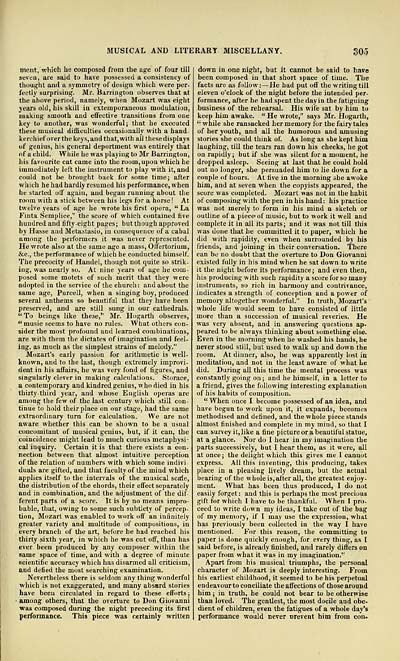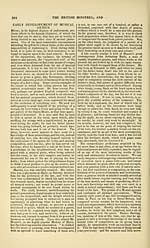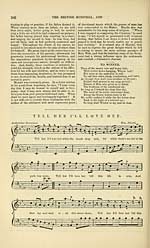Glen Collection of printed music > Printed music > British minstrel, and musical and literary miscellany
(313) Page 305
Download files
Complete book:
Individual page:
Thumbnail gallery: Grid view | List view

MUSICAL AND LITERART MISCELLANY.
30.5
ment, which he composed from the age of four till
seven, are said to have possessed a consistency of
thought and a symmetry of design which were per-
fectly surprising. Mr. Barrington observes that at
the above period, namely, when Mozart was eight
years old, his skill in extemporaneous modulation,
making smooth and effective transitions from one
key to another, was wonderful; that he executed
these musical difficulties occasionally with a hand-
kerchief over the keys, and that, with all these displays
of genius, his general deportment was entirely that
of a child. While he was playing to Mr Barrington,
his favourite cat came into the room, upon which he
immediately left the instrument to play with it, and
could not be brought back for some time; after
which he had hardly resumed his performance, when
he started off again, and began running about the
room with a stick between his legs for a horse! At
twelve years of age he wrote his first opera, " La
Finta Semplice," the score of which contained five
hundred and fifty-eight pages; but though approved
by Hasse and Metastasio, in consequence of a cabal
among the performers it was never represented.
He wrote also at the same age a mass, Otfertorium,
&c., the performance of which he conducted himself.
The precocity of Handel, though not quite so strik-
ing, was nearly so. At nine years of age he com-
posed some motets of such merit that they were
adopted in the service of the church : and about the
same age, Purcell, when a singing boy, produced
several anthems so beautiful that they have been
preserved, and are still sung in our cathedrals.
" To beings like these," Mr. Hogarth observes,
" music seems to have no rules. What others con-
sider the most profound and learned combinations,
are with them the dictates of imagination and feel-
ing, as much as the simplest strains of melody."
Mozart's early passion for arithmetic is well-
known, and to the last, though extremely improvi-
dent in his affairs, he was very fond of figures, and
singularly clever in making calculations. Storace,
a contemporary and kindred genius, who died in his
thirty. third year, and whose English operas are
among the few of the last century which still con-
tinue to hold their place on our stage, had the same
extraordinary turn for calculation. We are not
aware whether this can be shown to be a usual
concomitant of musical genius, but, if it can, the
coincidence might lead to much curious metaphysi-
cal inquiry. Certain it is that there exists a con-
nection between that almost intuitive perception
of the relation of numbers with which some indivi
duals are gifted, and that faculty of the mind which
applies itself to the intervals of the musical scale,
the distribution of the chords, their effect separately
and in combination, and the adjustment of the dif-
ferent parts of a score. It is by no means impro-
bable, that, owing to some such subtlety of percep-
tion, Mozart was enabled to work off an infinitely
greater variety and multitude of compositions, in
every branch of the art, before he had reached his
thirty sixth year, in which he was cut off, than has
ever been produced by any composer within the
same space of time, and with a degree of minute
scientific accuracy which has disarmed all criticism,
and defied the most searching examination.
Nevertheless there is seldom any thing wonderful
which is not exaggerated, and many absurd stories
have been circulated in regard to these efforts;
■ among others, that the overture to Don Giovanni
was composed during the night preceding its first
performance. This piece was certainly written
down in one night, but it cannot be said to have
been composed in that short space of time. The
facts are as follow: — He had put off the writing till
eleven o'clock of the night before the intended per-
formance, after he had spent the day in the fatiguing
business of the rehearsal. His wife sat by him to
keep him awake. " He wrote," says Mr. Hogarth,
'• while she ransacked her memory for the fairy tales
of her youth, and all the humorous and amusing
stories she could think of. As long as she kept him
laughing, till the tears ran down his cheeks, be got
on rapidly; but if she was silent for a moment, he
dropped asleep. Seeing at last that he could hold
out no longer, she persuaded him to lie down for a
couple of hours. At five in tiie morning she awoke
him, and at seven when the copyists appeared, the
score was completed. Mozart was not in the habit
of composing with the pen in his hand: his practice
was not merely to form in his mind a sketch or
outline of a piece of music, but to work it well and
complete it in all its parts; and it was not till this
was done that be committed it to paper, which he
did with rapidity, even when surrounded by his
friends, and joining in their conversation. There
can be no doubt that the overture to Don Giovanni
existed fully in his mind when he sat down to write
it the night before its performance; and even then,
his producing with such rapidity a score for so many
instruments, so rich in harmony and contrivance,
indicates a strength of conception and a power of
memory altogether wonderful." In truth, Mozart's
whole life would seem to have consisted of little
more than a succession of musical reveries. He
was very absent, and in answering questions ap^
peared to be always thinking about something else.
Even in the morning when he washed his hands, be
never stood still, but used to walk up and down the
room. At dinner, also, he was apparently lost in
meditation, and not in the least aware of what he
did. During all this time the mental process was
constantly going on ; and he himself, in a letter to
a friend, gives the following interesting explanation
of his habits of composition.
"When once I become possessed of an idea, and
have begun to work upon it, it expands, becomes
methodised and defined, and the whole piece stands
almost finished and complete in ray mind, so that I
can survey it, like a fine picture or a beautiful statue,
at a glance. Nor do I hear in my imagination the
parts successively, but I hear them, as it were, all
at once; the delight which this gives me 1 cannot
express. All this inventing, this producing, takes
place in a pleasing lively dream, but the actual
bearing of the whole is, after all, the greatest enjoy,
ment. What has been thus produced, I do not
easily forget : and this is perhaps the most precious
gift for which X have to be thankful. When I pro-
ceed to write down my ideas, I take out of the bag
of my memory, if I may use the expression, what
has previously been collected in the way I have
mentioned. For this reason, the committing to
paper is done quickly enough, for every thing, as I
said before, is already finished, and rarely differs on
paper from what it was in my imagination."
Apart from his musical triumphs, the personal
character of Mozart is deeply interesting. From
his earliest childhood, it seemed to be his perpetual
endeavour to conciliate the affections of those around
him ; in truth, he could not bear to be otherwise
than loved. The gentlest, the most docile and obe-
dient of children, even the fatigues of a whole day's
performance would never orevent him from con-
30.5
ment, which he composed from the age of four till
seven, are said to have possessed a consistency of
thought and a symmetry of design which were per-
fectly surprising. Mr. Barrington observes that at
the above period, namely, when Mozart was eight
years old, his skill in extemporaneous modulation,
making smooth and effective transitions from one
key to another, was wonderful; that he executed
these musical difficulties occasionally with a hand-
kerchief over the keys, and that, with all these displays
of genius, his general deportment was entirely that
of a child. While he was playing to Mr Barrington,
his favourite cat came into the room, upon which he
immediately left the instrument to play with it, and
could not be brought back for some time; after
which he had hardly resumed his performance, when
he started off again, and began running about the
room with a stick between his legs for a horse! At
twelve years of age he wrote his first opera, " La
Finta Semplice," the score of which contained five
hundred and fifty-eight pages; but though approved
by Hasse and Metastasio, in consequence of a cabal
among the performers it was never represented.
He wrote also at the same age a mass, Otfertorium,
&c., the performance of which he conducted himself.
The precocity of Handel, though not quite so strik-
ing, was nearly so. At nine years of age he com-
posed some motets of such merit that they were
adopted in the service of the church : and about the
same age, Purcell, when a singing boy, produced
several anthems so beautiful that they have been
preserved, and are still sung in our cathedrals.
" To beings like these," Mr. Hogarth observes,
" music seems to have no rules. What others con-
sider the most profound and learned combinations,
are with them the dictates of imagination and feel-
ing, as much as the simplest strains of melody."
Mozart's early passion for arithmetic is well-
known, and to the last, though extremely improvi-
dent in his affairs, he was very fond of figures, and
singularly clever in making calculations. Storace,
a contemporary and kindred genius, who died in his
thirty. third year, and whose English operas are
among the few of the last century which still con-
tinue to hold their place on our stage, had the same
extraordinary turn for calculation. We are not
aware whether this can be shown to be a usual
concomitant of musical genius, but, if it can, the
coincidence might lead to much curious metaphysi-
cal inquiry. Certain it is that there exists a con-
nection between that almost intuitive perception
of the relation of numbers with which some indivi
duals are gifted, and that faculty of the mind which
applies itself to the intervals of the musical scale,
the distribution of the chords, their effect separately
and in combination, and the adjustment of the dif-
ferent parts of a score. It is by no means impro-
bable, that, owing to some such subtlety of percep-
tion, Mozart was enabled to work off an infinitely
greater variety and multitude of compositions, in
every branch of the art, before he had reached his
thirty sixth year, in which he was cut off, than has
ever been produced by any composer within the
same space of time, and with a degree of minute
scientific accuracy which has disarmed all criticism,
and defied the most searching examination.
Nevertheless there is seldom any thing wonderful
which is not exaggerated, and many absurd stories
have been circulated in regard to these efforts;
■ among others, that the overture to Don Giovanni
was composed during the night preceding its first
performance. This piece was certainly written
down in one night, but it cannot be said to have
been composed in that short space of time. The
facts are as follow: — He had put off the writing till
eleven o'clock of the night before the intended per-
formance, after he had spent the day in the fatiguing
business of the rehearsal. His wife sat by him to
keep him awake. " He wrote," says Mr. Hogarth,
'• while she ransacked her memory for the fairy tales
of her youth, and all the humorous and amusing
stories she could think of. As long as she kept him
laughing, till the tears ran down his cheeks, be got
on rapidly; but if she was silent for a moment, he
dropped asleep. Seeing at last that he could hold
out no longer, she persuaded him to lie down for a
couple of hours. At five in tiie morning she awoke
him, and at seven when the copyists appeared, the
score was completed. Mozart was not in the habit
of composing with the pen in his hand: his practice
was not merely to form in his mind a sketch or
outline of a piece of music, but to work it well and
complete it in all its parts; and it was not till this
was done that be committed it to paper, which he
did with rapidity, even when surrounded by his
friends, and joining in their conversation. There
can be no doubt that the overture to Don Giovanni
existed fully in his mind when he sat down to write
it the night before its performance; and even then,
his producing with such rapidity a score for so many
instruments, so rich in harmony and contrivance,
indicates a strength of conception and a power of
memory altogether wonderful." In truth, Mozart's
whole life would seem to have consisted of little
more than a succession of musical reveries. He
was very absent, and in answering questions ap^
peared to be always thinking about something else.
Even in the morning when he washed his hands, be
never stood still, but used to walk up and down the
room. At dinner, also, he was apparently lost in
meditation, and not in the least aware of what he
did. During all this time the mental process was
constantly going on ; and he himself, in a letter to
a friend, gives the following interesting explanation
of his habits of composition.
"When once I become possessed of an idea, and
have begun to work upon it, it expands, becomes
methodised and defined, and the whole piece stands
almost finished and complete in ray mind, so that I
can survey it, like a fine picture or a beautiful statue,
at a glance. Nor do I hear in my imagination the
parts successively, but I hear them, as it were, all
at once; the delight which this gives me 1 cannot
express. All this inventing, this producing, takes
place in a pleasing lively dream, but the actual
bearing of the whole is, after all, the greatest enjoy,
ment. What has been thus produced, I do not
easily forget : and this is perhaps the most precious
gift for which X have to be thankful. When I pro-
ceed to write down my ideas, I take out of the bag
of my memory, if I may use the expression, what
has previously been collected in the way I have
mentioned. For this reason, the committing to
paper is done quickly enough, for every thing, as I
said before, is already finished, and rarely differs on
paper from what it was in my imagination."
Apart from his musical triumphs, the personal
character of Mozart is deeply interesting. From
his earliest childhood, it seemed to be his perpetual
endeavour to conciliate the affections of those around
him ; in truth, he could not bear to be otherwise
than loved. The gentlest, the most docile and obe-
dient of children, even the fatigues of a whole day's
performance would never orevent him from con-
Set display mode to: Large image | Transcription
Images and transcriptions on this page, including medium image downloads, may be used under the Creative Commons Attribution 4.0 International Licence unless otherwise stated. ![]()
| Special collections of printed music > Glen Collection of printed music > Printed music > British minstrel, and musical and literary miscellany > (313) Page 305 |
|---|
| Permanent URL | https://digital.nls.uk/91438701 |
|---|
| Description | Scottish songs and music of the 18th and early 19th centuries, including music for the Highland bagpipe. These are selected items from the collection of John Glen (1833 to 1904). Also includes a few manuscripts, some treatises, and other books on the subject. |
|---|
| Description | The Glen Collection and the Inglis Collection represent mainly 18th and 19th century Scottish music, including Scottish songs. The collections of Berlioz and Verdi collected by bibliographer Cecil Hopkinson contain contemporary and later editions of the works of the two composers Berlioz and Verdi. |
|---|

